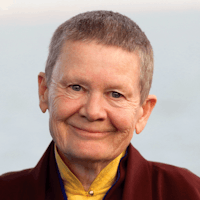Authentic joy is not a euphoric state or a feeling of being high. Rather, it is a state of appreciation that allows us to participate fully in our lives.
Pema Chödrön

Authentic Joy
Topic: Joy & Happiness
Authentic joy is not a euphoric state or a feeling of being high. Rather, it is a state of appreciation that allows us to participate fully in our lives. We train in rejoicing in the good fortune of self and others.
Pema Chödrön, born Deirdre Blomfield-Brown on July 14, 1936, in New York City, grew up on a farm in New Jersey. She attended Miss Porter's School before earning a degree in English literature from Sarah Lawrence College and a master’s in elementary education from the University of California, Berkeley. She married at 21 and had two children before experiencing two divorces. Her spiritual journey led her to study Buddhism with Lama Chime Rinpoche in London and Chögyam Trungpa Rinpoche in the United States. In 1974, she was ordained as a novice nun by the Sixteenth Gyalwa Karmapa, Rangjung Rigpe Dorje, and in 1981, became the first American woman fully ordained in the Vajrayana tradition.
Chödrön played a key role in bringing Tibetan Buddhism to the West. In the early 1980s, Trungpa Rinpoche appointed her director of the Boulder Shambhala Center in Colorado. She later moved to Gampo Abbey in Nova Scotia, the first Tibetan Buddhist monastery in North America for Western students, becoming its director in 1986. Recognized as an acharya (senior teacher) in 1993, she continued teaching despite health challenges, including chronic fatigue syndrome. Her books, such as When Things Fall Apart (1996) and No Time to Lose (2005), explore resilience, mindfulness, and compassion, emphasizing shenpa, the habitual grasping that leads to suffering.
In 2020, Chödrön retired from her role as acharya within Shambhala International, citing concerns over the organization’s direction. She continues to teach, lead retreats, and study with her teacher, Dzigar Kongtrul Rinpoche. Recognized for her contributions to Buddhist practice, she received the Global Bhikkhuni Award in 2016. Though she stepped back from institutional leadership, she remains a guiding voice in contemporary Buddhism, emphasizing the power of mindfulness and compassion in daily life.
The Places That Scare You
Pema Chödrön, The Places That Scare You: A Guide to Fearlessness in Difficult Times, Shambhala Publications, 2001.

Pema Chödrön
Theme: Joy

About This Pema Chödrön Quote [Commentary]
Pema Chödrön describes authentic joy not as “a euphoric state or a feeling of being high,” but as “a state of appreciation that allows us to participate fully in our lives.” She redirects attention from fleeting emotional highs to a steady presence rooted in gratitude. Authentic joy, in her view, emerges through a cultivated openness to each moment rather than through seeking temporary pleasure. By grounding joy in appreciation, Pema Chödrön invites a fuller, more engaged experience of life.
She emphasizes that we “train in rejoicing in the good fortune of self and others,” expanding the experience of joy beyond personal achievement. In this practice, appreciation becomes a shared experience, dissolving feelings of isolation and competition. Recognizing the good in others alongside one’s own blessings strengthens a sense of connection. Pema Chödrön’s teaching suggests that joy grows when we shift from self-centered striving to an awareness of collective well-being.
Cultivating authentic joy requires patience and perseverance. Pema Chödrön describes it as a process of “training” in mindfulness and maitri (loving-kindness), remaining present even as strong emotions and the illusion of separateness arise. Trusting in “our basic goodness,” individuals gradually make joy “more and more accessible.” Through this steady practice, authentic joy becomes not a rare peak experience, but a natural expression of living fully and appreciatively in the present.
Pema Chodron—Finding The Ability To Rejoice
“As we train in the bodhichitta practices, we gradually feel more joy, the joy that comes from a growing appreciation of our basic goodness. We still experience strong conflicting emotions, we still experience the illusion of separateness, but there’s a fundamental openness that we begin to trust. This trust in our fresh, unbiased nature brings us unlimited joy—a happiness that’s completely devoid of clinging and craving. This is the joy of happiness without a hangover.
How do we cultivate the conditions for joy to expand? We train in staying present. In sitting meditation, we train in mindfulness and maitri: in being steadfast with our bodies, our emotions, our thoughts. We stay with our own little plot of earth and trust that it can be cultivated, that cultivation will bring it to it’s full potential. Even though it’s full of rocks and the soil is dry, we begin to plow this plot with patience. We let the process evolve naturally…
But as we use the bodhichitta practices to train, we may come to the point where we see the magic of the present moment; we may gradually wake up to the truth that we have always been warriors living in a sacred world. This is the ongoing experience of limitless joy. We won’t always experience this, it’s true. But year by year it becomes more and more accessible.”
—Pema Chödrön, “The Places That Scare You: A Guide to Fearlessness in Difficult Times”, Shambhala Publications, 2001. Pp. 61 & 65.
Related Quotes
Copyright © 2017 – 2025 LuminaryQuotes.com About Us